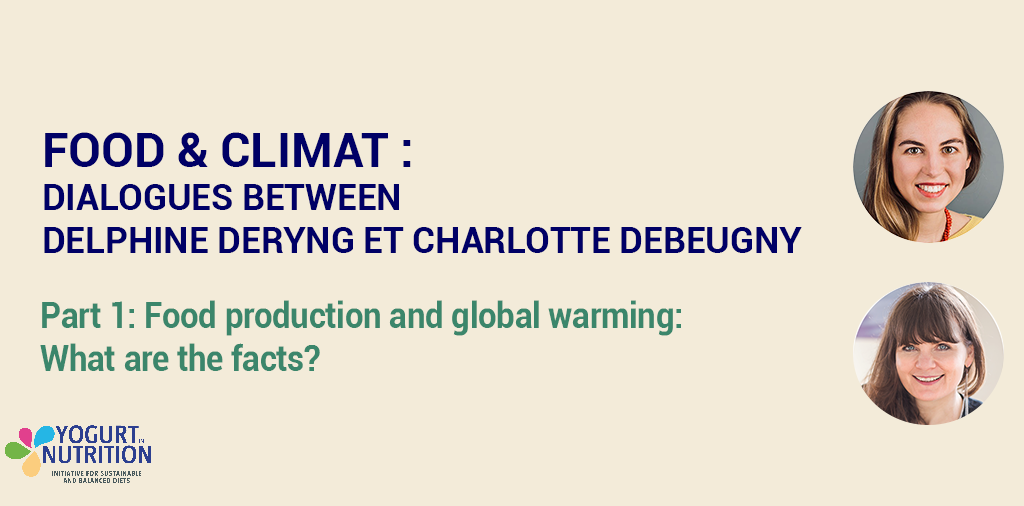Food and Climate: Dialogues between a climate and agriculture scientist and a nutritionist
Delphine Deryng is a climate and agriculture scientist, specializing in the issues of risk and adaptation of the agri-food sector to climate hazards, and mitigation of greenhouse gas emissions. Delphine is the lead author of the second part of the IPCC‘s sixth report, published in 2022.
Charlotte Debeugny is a registered nutritionist under British law and passionate about science and healthy cooking. We thought it would be interesting to cross their approaches and points of view. We invite you to discover this interview, through 3 episodes. The interview is in french, subtitled in english.
Food production and global warming: what are the facts?
What we eat, through the modes of agricultural production, transformation and choices of consumption, has an impact on the environment, the climate, biodiversity, greenhouse gases… The entire food system is involved in these changes.
At the same time, agriculture is also highly dependent on environmental hazards related to global warming. Agricultural production depends on temperatures, precipitation, drought episodes, resources… and all climatic hazards pose a growing risk to global food security.
According to the FAO, the agricultural sector contributes between 18 and 30% of greenhouse gases (GHG) in the world. When the entire food chain is taken into account (including production, processing, transport, storage, consumption, etc.), this can reach 37%. In France, according to ADEME data (Food and environment: fields of action for professionals, 2022), the food system, from production to consumption, is responsible for a quarter of greenhouse gas emissions. More specifically, methane emissions associated with meat production account for 45% of the emissions from the agricultural sector (on a global scale, in agricultural systems, methane comes essentially from livestock and rice production).
The growing temperatures change the seasons, modifying the frequencies and intensities of the cold and hot seasons. There is an increase in these extreme episodes (intense heat waves, periods of drought, fire risk, torrential rains, flood risks, etc.), which disrupt food production systems.
These increasing risks, directly linked to climate change, have an impact on agricultural production both in terms of quantity and quality of crop production (lower nutritional density, particularly concerning proteins, iron, zinc). For instance, the increase in CO2 induces an unbalanced photosynthesis reaction and this leads in a medium term to a negative effect on the quantity of proteinaceous matter in crops.
To be continued in a few days, the next part of this interview, on the ways to act on a global and individual scale…
 Delphine Deryng is a climatologist specializing in the issues of risk and adaptation of the agri-food sector to climate hazards, and mitigation of greenhouse gas emissions. Delphine is lead author of the second part of the IPCC’s sixth report, published in 2022. She is also a visiting scholar at Humboldt University in Berlin since 2018. Delphine holds a PhD in Environmental Science from the University of East Anglia, a Master’s degree in Geography from McGill University and a Master’s degree in Physics and Cosmology from the University of Paris Diderot.
Delphine Deryng is a climatologist specializing in the issues of risk and adaptation of the agri-food sector to climate hazards, and mitigation of greenhouse gas emissions. Delphine is lead author of the second part of the IPCC’s sixth report, published in 2022. She is also a visiting scholar at Humboldt University in Berlin since 2018. Delphine holds a PhD in Environmental Science from the University of East Anglia, a Master’s degree in Geography from McGill University and a Master’s degree in Physics and Cosmology from the University of Paris Diderot.

Charlotte Debeugny (RNutr) is a British registered nutritionist. A nutrition expert who is passionate about science and good food. She is very aware that healthy food choices are also good for the planet. She also chairs a FENS (Federation of European Nutrition Societies) working group that focuses on improving the quality of scientific communication about nutrition to the public.
For more information:
- The Intergovernmental Panel on Climate Change (IPCC) was established to provide comprehensive assessments of the state of scientific, technical and socio-economic knowledge about climate change, its causes, impacts and coping strategies. The panel is now in its 6th assessment cycle. All data is available online.
Additional references:
-
How climate change affects food system and nutrition? Compte-rendu en anglais de la conférence de Kristie L. Ebi, PhD, MPH (University of Washington Seattle, Washington, USA) – ASN 2022).
-
Reducing food’s environmental impacts through producers and consumers (Poore et al, 2018, Science)
-
Food systems are responsible for a third of global anthropogenic GHG emissions (Crippa et al, 2021, Nature)
-
Creating a sustainable food future – World Resources Institute (2019)
-
Methane Emissions from Ruminants in Australia: Mitigation Potential and Applicability of Mitigation Strategies (Black et al, 2021, Animals)
-
How much of global greenhouse gas emissions come from food? – Our world in data (2021)
-
Animal Agriculture and Climate Change in the US and UK Elite Media: Volume, Responsibilities, Causes and Solutions (Kristiansen et al, 2020, Environmental communication)
-
IPCC Report – food security (2019)
-
Climate change 2022 – summary for policy makers (IPCC, 2022) (!) lien mort sur le site FR
-
Le secteur agricole et forestier est à la fois émetteur et capteur de gaz à effet de serre, Ministère de l’agriculture et de la souveraineté alimentaire, adaptée du rapport national Secten 2022 du Citepa
-
Impact of anthropogenic CO2 emissions on global human nutrition (Nature Climate Change, 2018)



